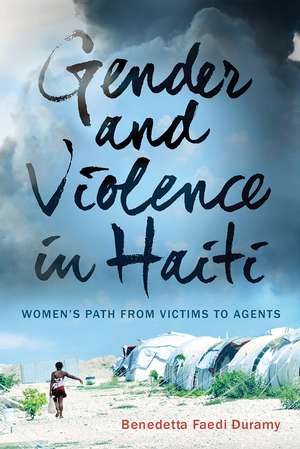Gender and Violence in Haiti: Women’s Path from Victims to Agents
Autor Benedetta Faedi Duramyen Limba Engleză Paperback – 22 apr 2014
Women in Haiti are frequent victims of sexual violence and armed assault. Yet an astonishing proportion of these victims also act as perpetrators of violent crime, often as part of armed groups. Award-winning legal scholar Benedetta Faedi Duramy visited Haiti to discover what causes these women to act in such destructive ways and what might be done to stop this tragic cycle of violence.
Gender and Violence in Haiti is the product of more than a year of extensive firsthand observations and interviews with the women who have been caught up in the widespread violence plaguing Haiti. Drawing from the experiences of a diverse group of Haitian women, Faedi Duramy finds that both the victims and perpetrators of violence share a common sense of anger and desperation. Untangling the many factors that cause these women to commit violence, from self-defense to revenge, she identifies concrete measures that can lead them to feel vindicated and protected by their communities.
Faedi Duramy vividly conveys the horrifying conditions pervading Haiti, even before the 2010 earthquake. But Gender and Violence in Haiti also carries a message of hope—and shows what local authorities and international relief agencies can do to help the women of Haiti.
Gender and Violence in Haiti is the product of more than a year of extensive firsthand observations and interviews with the women who have been caught up in the widespread violence plaguing Haiti. Drawing from the experiences of a diverse group of Haitian women, Faedi Duramy finds that both the victims and perpetrators of violence share a common sense of anger and desperation. Untangling the many factors that cause these women to commit violence, from self-defense to revenge, she identifies concrete measures that can lead them to feel vindicated and protected by their communities.
Faedi Duramy vividly conveys the horrifying conditions pervading Haiti, even before the 2010 earthquake. But Gender and Violence in Haiti also carries a message of hope—and shows what local authorities and international relief agencies can do to help the women of Haiti.
| Toate formatele și edițiile | Preț | Express |
|---|---|---|
| Paperback (1) | 285.16 lei 43-57 zile | |
| Rutgers University Press – 22 apr 2014 | 285.16 lei 43-57 zile | |
| Hardback (1) | 824.18 lei 43-57 zile | |
| Rutgers University Press – 22 apr 2014 | 824.18 lei 43-57 zile |
Preț: 285.16 lei
Nou
Puncte Express: 428
Preț estimativ în valută:
54.57€ • 56.65$ • 45.50£
54.57€ • 56.65$ • 45.50£
Carte tipărită la comandă
Livrare economică 24 martie-07 aprilie
Preluare comenzi: 021 569.72.76
Specificații
ISBN-13: 9780813563145
ISBN-10: 0813563143
Pagini: 188
Dimensiuni: 152 x 229 x 13 mm
Greutate: 0.29 kg
Ediția:None
Editura: Rutgers University Press
Colecția Rutgers University Press
ISBN-10: 0813563143
Pagini: 188
Dimensiuni: 152 x 229 x 13 mm
Greutate: 0.29 kg
Ediția:None
Editura: Rutgers University Press
Colecția Rutgers University Press
Notă biografică
BENEDETTA FAEDI DURAMY is an associate professor of law at Golden Gate University School of Law in San Francisco. She has received numerous awards for her research on gender-based violence and has authored several book chapters and articles on human rights, gender issues and children’s rights.
Cuprins
Acknowledgments
List of Acronyms and Organizations
Introduction
1. Gender-Bsed Violence and Women's Violence in Context
2. Gender-Based Violence in Haiti
3. Understanding Women's Violence in Haiti
4. Legal Frameworks
5. Victims' Help-Seeking and the Criminal-Justice Response
6. Strategies for Action
7. Women in the Aftermath of the Earthquake
Notes
References
Index
List of Acronyms and Organizations
Introduction
1. Gender-Bsed Violence and Women's Violence in Context
2. Gender-Based Violence in Haiti
3. Understanding Women's Violence in Haiti
4. Legal Frameworks
5. Victims' Help-Seeking and the Criminal-Justice Response
6. Strategies for Action
7. Women in the Aftermath of the Earthquake
Notes
References
Index
Recenzii
"Duramy details a culture of impunity that makes violence against women unlikely to be reported, let alone prosecuted. The book succeeds in its nuanced look at Haitian women's relationships to violence, and its main strength is the use of women's lived experiences to blur the categories of 'victim' and 'perpetrator'. Duramy's case study...will be useful to policymakers and international aid workers working on post-conflict reintegration programs and criminal justice reforms that see women as more than just 'dependants'."
"One of the greatest strengths of the book is Duramy's ability to contextualize and historicize the pandemic levels of violence against Haitian girls and women while not justifying it … In sum, Gender and Violence in Haiti is a very powerful and, due to the content, disturbing read ... I thank Professor Duramy for researching and writing about a topic as urgent and yet overlooked as this one."
"In short, Prof. Duramy’s book is detailed, even-handed, and thoughtful. It upends assumptions that impede deeper understanding of the complicated issues that Haitian women living in poverty face. The book offers readers a nuanced view of an extraordinarily complex situation and presents a range of carefully crafted solutions that one can only hope will inform policy makers in Haiti and beyond. "
"Uses rich qualitative data to raise awareness of the extent to which gender-based violence has entrenched itself deeply into the fabric of Haitian society."
"A concise, alarming, and much-needed contribution that will benefit academics working on Haiti and women’s rights, specialists of human rights, and practitioners of humanitarianism."
Descriere
Women in Haiti are frequent victims of sexual violence and armed assault. Yet an astonishing proportion of these victims also act as perpetrators of violent crime, often as part of armed groups. In Gender and Violence in Haiti, award-winning legal scholar Benedetta Faedi Duramy visits Haiti to discover why these women act in such destructive ways and what might be done to stop this tragic cycle of violence.

















